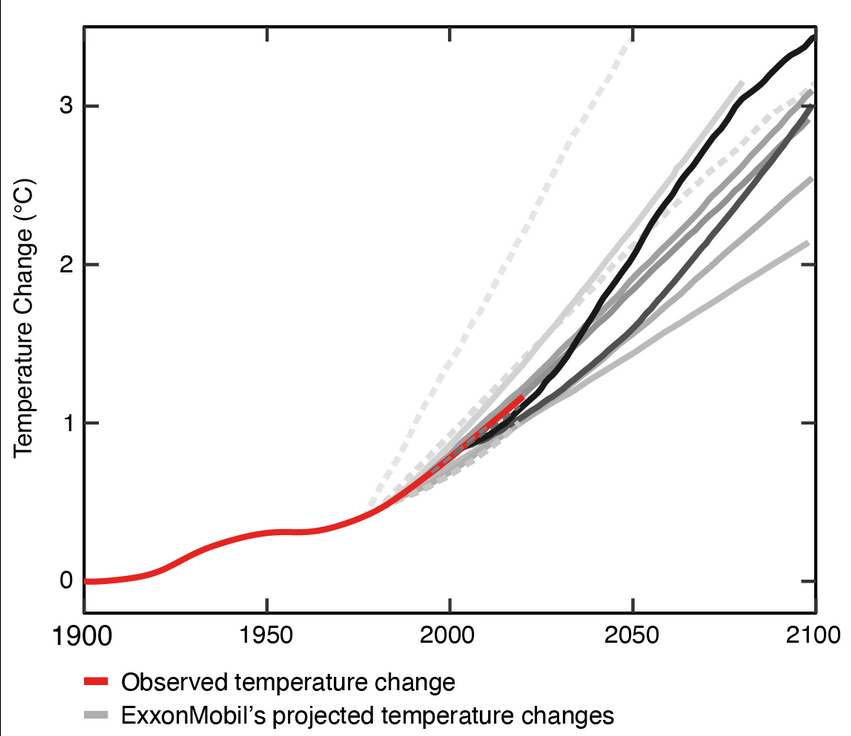New research reveals the extent of ExxonMobil’s secret knowledge of climate change nearly 50 years ago
The findings are the latest in a series of revelations about the company’s historic awareness of the links between climate change and fossil fuels.
It was in 2015 that leaked documents first revealed that the US fossil fuel giant ExxonMobil knew as far back as the 1970s about the “potentially catastrophic” science of climate change and the business threat it posed.
The internal documents, most of which the company had kept secret, contained not only an acknowledgement of the link between burning fossil fuels and rising global temperatures, but data-driven projections of just how much the climate was likely to change.
New research published today in the journal Science found that those projections, produced by ExxonMobil scientists between 1977 and 2003, foresaw with immense accuracy the global heating that was observed in the decades after. This was “prior and parallel to orchestrating lobbying and propaganda campaigns to delay climate action”, the report authors said.
ExxonMobil has consistently denied that it has misled the public, lawmakers or investors and told Channel 4 News that this issue has come up “several times in recent years” and that many people’s conclusions were “wrong”.
What does the new research tell us?
Researchers at Harvard University and the Potsdam Institute for Climate Impact Research analysed data from the previously-leaked internal ExxonMobil documents, dated between 1977 and 2003.
They found that the company’s own scientists predicted that the continued burning of fossil fuels would lead to a global temperature rise of around 0.2 degrees Celsius each decade. Since the 1970s, this has largely stacked up.
“We find that most of their projections accurately forecast warming consistent with subsequent observations,” the report said. “Their projections were also consistent with, and at least as skillful as, those of independent academic and government models.”
The findings are summarised by a single graph which compares ExxonMobil’s historic climate projections with real-world observations that followed in the years after (where solid red line are real-world observations; dotted grey lines are projections internally reproduced by ExxonMobil scientists from other sources; and solid grey or black lines are projections from ExxonMobil scientists):

The report notes that the company’s scientists’ climate projections were broadly more accurate than those of NASA scientist James Hansen when he famously presented on climate change to the US Congress in 1988.
Benjamin Franta from the University of Oxford, who wasn’t involved in the research, told Channel 4 News: “This is the most advanced quantitative assessment of ExxonMobil’s internal and public climate projections going back to the late 1970s, showing that the company accurately predicted global warming but nonetheless went on to conceal its knowledge and mislead the public about the enormous damage caused by fossil fuels.”
What do the findings mean?
Since the revelations in 2015, a string of climate-related lawsuits have come following the revelations of historic climate knowledge held not only by ExxonMobil, but a number of other fossil fuel companies and trade associations.
In the US, especially, whole cities and states have accused fossil fuel companies of being liable for climate damage, of their climate impact lowering living standards and impacting human health. Cases have ranged from law on consumer protection and public nuisance, to one city attempting to sue for the costs of a rising ocean and the city’s building of sea walls.
Central to many of the cases is the assertion by claimants that the fossil fuel industry has known of the dangers its business posed for decades, despite contradictory public statements and attempts to obfuscate the science.
Questions over ExxonMobil’s lobbying against measures to tackle climate change continue. In 2021, Channel 4 News reported secret filming of an ExxonMobil lobbyist who detailed how the oil giant used its power and influence to water down US climate legislation.
Franta told Channel 4 News that today’s research is “important for litigation, public policy, journalism and public communication, corporate accountability, and more. It reinforces the notion that corporate malfeasance and political obstruction — not a lack of scientific knowledge — have been the main roadblocks to solving climate change. And of course, it implies the need to remove those roadblocks to achieve the action we urgently need today.”
In response to the findings, ExxonMobil told Channel 4 News that this issue has come up “several times in recent years” and that many people’s conclusions were “wrong”.
ExxonMobil pointed to a 2019 New York Supreme Court case brought by the state’s attorney general which claimed the company had engaged in fraud over statements on the costs of climate change regulation.
The judge ruled in ExxonMobil’s favour, saying that no fraud had been committed and that the company’s executives and employees had acted in good faith.
ExxonMobil response in full:
‘This issue has come up several times in recent years and, in each case, our answer is the same: those who talk about how “Exxon Knew” are wrong in their conclusions. In 2019, Judge Barry Ostrager of the NY State Supreme Court listened to all the facts in a related case before him and wrote: “What the evidence at trial revealed is that ExxonMobil executives and employees were uniformly committed to rigorously discharging their duties in the most comprehensive and meticulous manner possible….The testimony of these witnesses demonstrated that ExxonMobil has a culture of disciplined analysis, planning, accounting, and reporting.”’